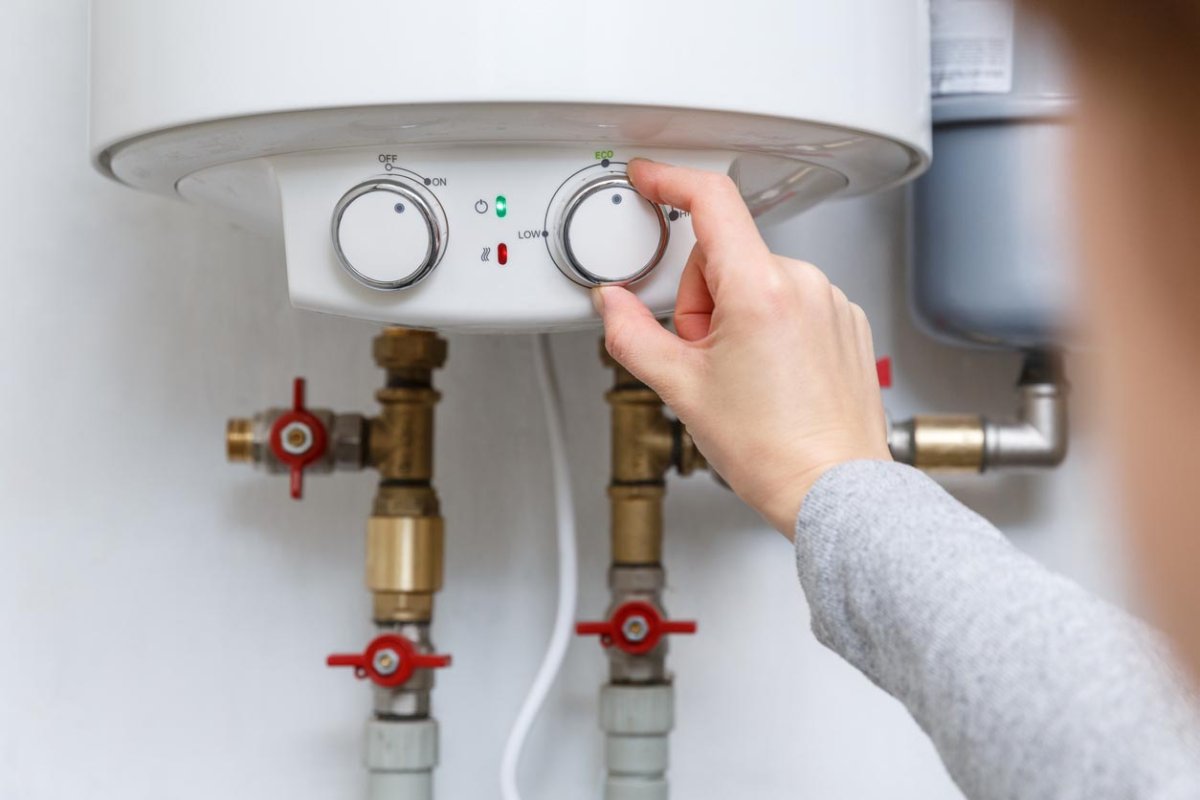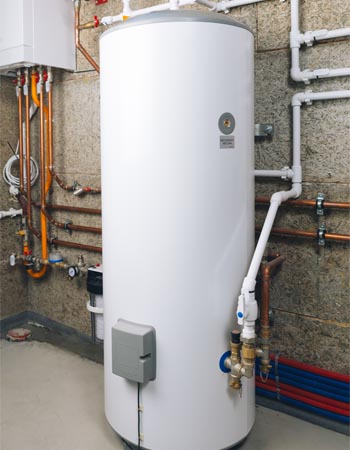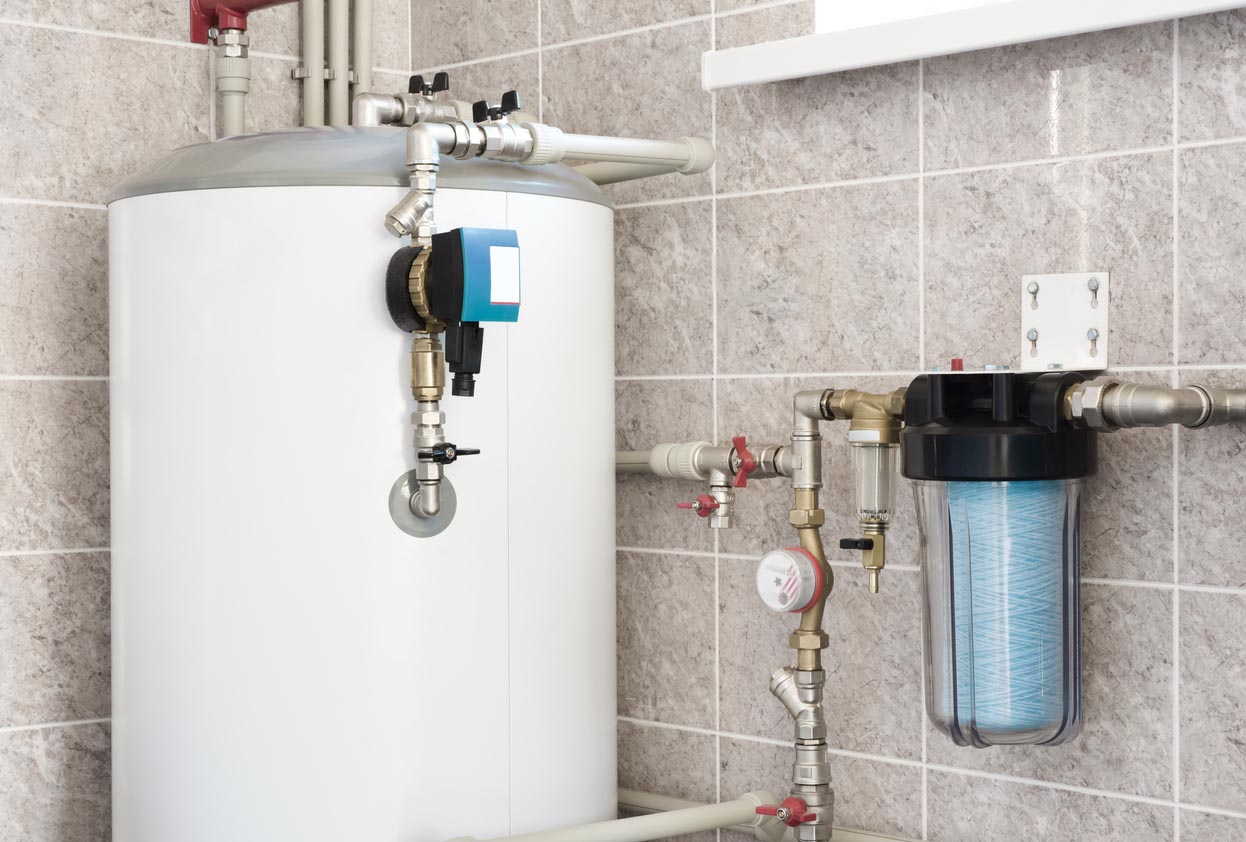

We may earn revenue from the products available on this page and participate in affiliate programs. Learn More ›
Choosing between a gas or electric water heater can be a bit confusing to homeowners due to various items that influence monthly costs. One important consideration is the type of water heater, whether it be a tankless water heater, electric or gas, or a traditional tank-style water heater. Tankless water heaters are known for their energy efficiency, but whether gas or electric is cheaper depends on the local utility rates and usage.
The water heater size also plays a crucial role in gas vs. electric water heater monthly cost. A high-efficiency gas water heater may seem like a good choice, but if it’s too big for the needs of the household, it can lead to higher bills. Conversely, the most efficient electric water heater in the wrong size also won’t save a homeowner money.
Switching from a gas to an electric water heater could lower a homeowner’s carbon footprint, but the initial installation cost can be high. It’s important for homeowners to compare the cheapest gas water heater to the electric alternative and consider the long-term benefits. Water heater efficiency and water heater safety are also important. Electric heat pump water heaters are highly efficient and safe, while gas water heaters require proper ventilation.
To determine cost, it’s recommended that homeowners use a gas vs. electric water heater cost calculator, factoring in the average cost of an electric water heater per month, the yearly cost of a gas vs. an electric tankless water heater, and the difference between gas and electric water heater models. By weighing these factors, homeowners can make an informed decision regarding the best water heaters based on their unique needs and budget.
1. Electric water heaters tend to have higher monthly costs than gas water heaters, though the up-front costs are lower.

When comparing electric and gas water heaters, it’s important for homeowners to consider both the monthly operating costs and the initial investment. Electric water heater cost per month is typically higher because electricity is generally more expensive than natural gas. Electric water heaters tend to have lower up-front costs, making them an attractive choice for those looking to save on initial expenses.
Gas water heaters, on the other hand, typically have lower monthly operating costs due to the lower cost of natural gas. They are known for their efficiency in heating water quickly and effectively. The trade-off is that gas water heaters usually have a higher initial price tag, which can be a hurdle for some homeowners. A gas water heater is typically $100 to $200 more than a similar-quality electric model, and homeowners can pay as little as a few hundred dollars to more than $2,000 for both electric and gas water heaters.
Tankless and electric heat pump water heaters are considered some of the most energy efficient types, but they’re much more expensive to buy and install than standard water heaters. Choosing between an electric heat pump water heater vs. gas is another important choice for a homeowner to make if they decide to go that route. Tankless water heater costs can be as much as $3,000, and because this type of water heater also has a more complex installation, the initial cost can be higher.
Ultimately, the choice between electric and gas water heaters depends on a homeowner’s specific circumstances, such as their budget, their local utility rates, their choice of the best water heater brands, and their long-term energy-efficiency goals. It’s important for homeowners to weigh these factors for water heater comparison to make the right decision for their home and finances.
2. The exact cost difference can vary since the price of gas and electricity fluctuates.
The exact cost difference between gas and electric water heaters can vary significantly due to the fluctuating prices of gas and electricity. These fluctuations are influenced by a range of factors, including global energy markets, supply and demand, seasonal changes, and even geopolitical events. As a result, the monthly operating costs of a water heater can be subject to these price variations.
To make an informed decision on water heating, it’s crucial for homeowners to keep an eye on their local utility rates and consider historical pricing trends. They can also consult with their utility provider to get a better understanding of how rates may change over time. It’s also a good idea for homeowners to use online calculators or energy consumption tools to estimate the potential monthly and yearly expenses for both gas and electric water heaters based on their specific usage patterns.
The amount of gas a water heater uses depends on several factors including the type of water heater, its size, its efficiency, and a household’s hot water usage. Generally, gas water heaters are known for their efficiency and ability to provide a quick and continuous supply of hot water, making them a popular choice for many households. On average, a gas water heater costs about $30 per month and an electric version costs approximately $42 per month to operate.
By staying informed about the current energy-pricing landscape and factoring in the fluctuations, homeowners can make a more accurate assessment of the cost difference between gas and electric water heaters and determine which option will work the best for them.
3. Gas water heaters require more maintenance than electric ones, and maintenance costs could negate some of the monthly cost savings.
Since gas water heaters typically require more maintenance than electric ones, this is an important factor for homeowners to consider when evaluating the overall cost of ownership. While gas water heaters can provide cost savings on monthly operating expenses due to the lower cost of natural gas, maintenance costs can offset some of these savings.
Maintenance for gas water heaters includes tasks such as regularly inspecting and cleaning the burner and its components, checking the flue for obstructions, and ensuring proper ventilation. The tank of a traditional gas water heater may need periodic flushing to remove sediment buildup, which can affect efficiency. Knowing why a water heater is making noise can inform whether a water heater needs to be replaced and what to expect for water heater replacement costs.
Electric water heaters have fewer maintenance requirements since they don’t have a combustion process and associated components. This can make them more convenient and cost-effective in terms of maintenance. Understanding why an electric water heater isn’t working and who fixes water heaters are two things homeowners will want to research ahead of time.
It is important for homeowners to note that maintenance is a crucial aspect of ensuring the water heater’s efficiency and safety, regardless of the type. Neglecting maintenance can lead to decreased efficiency, more significant water heater repair costs, or even safety hazards. When choosing between gas and electric water heaters, it’s essential that homeowners consider both the monthly cost savings and the long-term maintenance requirements. Regular maintenance can help extend the lifespan of a water heater and ensure it operates efficiency, potentially outweighing the maintenance costs.

4. Gas water heaters tend to have a shorter lifespan than electric ones, so owners will need to budget for replacement sooner.
Gas water heaters typically have a shorter lifespan compared with electric water heaters, which is something homeowners will want to consider. While gas water heaters are known for their efficiency and cost savings in the short term, the need for replacement can impact the long-term budget.
The average lifespan of a gas water heater usually falls in the range of 8 to 12 years, depending on factors such as maintenance, water quality, and usage. In contrast, electric water heaters have a longer lifespan, often ranging from 10 to 15 years.
Because of this disparity in lifespan, owners of gas water heaters may need to budget for replacement sooner, in addition to factoring in maintenance and monthly operating costs. The cost of purchasing and installing a new water heater can be a significant expense.
Switching from a gas to an electric water heater can be a significant investment, and the expense will depend on various factors. Knowing these key considerations can help homeowners understand how they can affect the cost of making the transition.
- Initial equipment costs. Electric water heaters typically have a lower up-front cost than gas models. When homeowners decide to purchase a new electric water heater, they’ll need to hire a professional to install it. The cost of the new unit and installation can vary depending on the size and type of water heater they choose.
- Electrical work. If the home is not already equipped for an electric water heater, a homeowner will need to invest in electrical modifications, such as wiring and electrical panels, to accommodate the new system. This can increase the initial expense.
- Ventilation. Since gas water heaters require proper ventilation, when a homeowner installs an electric water heater, the home may no longer need a flue or venting system. Removing or modifying the existing ventilation system can affect the total cost.
- Utility connections. The homeowner will need to hire a professional to disconnect the gas supply and install the necessary electrical connections, which will involve additional costs.
- Permits and labor. The installation process may require permits and labor, especially if significant modifications to the home’s structure are needed.
- Energy efficiency and savings. Homeowners will want to consider the long-term energy efficiency and potential savings associated with switching to electric. While the initial investment might be higher, homeowners could see lower monthly operating costs over time.
It’s essential for homeowners to get quotes from qualified professionals who install water heaters to get a clear picture of the costs involved in switching from a gas to an electric water heater. Depending on the specific circumstances, the expense of the transition may vary, and a homeowner will want to weigh this against the potential savings and benefits in the long run. The best plumbing services, such as Mr. Rooter or Roto-Rooter, can advise homeowners on the best choice for their home.
5. Homeowners can keep their monthly water heater costs down by trying to reduce their water usage.
One effective way for homeowners to keep their monthly water heater costs down is by reducing their water usage. Knowing some practical tips can help homeowners conserve hot water and lower energy bills.
- Shorter showers. Homeowners can encourage family members to take shorter showers. Reducing the time spent in the shower can significantly cut down hot water consumption.
- Fix leaks. Homeowners will want to promptly repair any leaking faucets or pipes. Even small leaks can waste a considerable amount of hot water over time.
- Use efficient appliances. Investing in energy-efficient appliances such as low-flow showerheads and faucets can help homeowners reduce water usage without sacrificing water pressure.
- Wash with cold water. It’s recommended that homeowners use cold water for laundry whenever possible. Many modern detergents are designed to work effectively in cold water.
- Insulate hot water pipes. Insulating hot water pipes helps maintain water temperature during transit, reducing the need to reheat water in the pipes.
- Set the thermostat to optimal temperature. Homeowners will want to adjust the water heater’s thermostat to a safe and comfortable yet efficient temperature, typically around 120 degrees Fahrenheit.
- Install a timer. Using a timer to schedule their water heater’s operation can ensure homeowners that their water heater isn’t heating water when it’s not needed, such as during the night or when they’re away from home.
- Limit dishwashing. It’s a good idea for homeowners to run their dishwasher with full loads and use the energy-saving mode if available.
- Be mindful of usage. Homeowners may want to be mindful of how they use hot water throughout the day and try to avoid simultaneous, heavy use that may strain the water heater.
- Regular maintenance. Keeping the water heater well maintained by flushing the tank periodically can remove sediment and ensure it’s in good working condition.
An electric water heater can waste a significant amount of electricity if it’s not used efficiently. Factors such as the water heater’s size, temperature settings, and maintenance can impact electricity consumption. Heat loss through the tank and long periods of standby heating can contribute to wasted energy. To reduce the cost of operating an electric water heater, homeowners can lower the thermostat temperature to around 120 degrees Fahrenheit, insulate the water heater tank to reduce heat loss, fix leaks promptly, opt for a tankless electric water heater, and maintain the water heater by periodically flushing the tank.
Homeowners can learn about ways to minimize the cost of running a gas water heater. Some actions can include setting the thermostat to an energy-efficient temperature, insulating the hot water pipes, using low-flow fixtures to reduce hot water usage, ensuring proper ventilation for safety, and regularly maintaining the water heater to keep it running efficiently.
By implementing these water-saving practices, homeowners can effectively reduce their hot water consumption, leading to lower monthly costs while also contributing to energy conservation and environmental sustainability.

6. Ultimately, homeowners will want to weigh the pros and cons of each type of water heater, including their monthly operational costs, before deciding which works best for them.
When it comes to choosing the right type of water heater for their homes, homeowners will want to weigh the pros and cons of water heating gas vs. electric, especially in terms of their monthly operational costs. Homeowners can compare the benefits and drawbacks of each type of water heater to determine which will work best for their home and their budget.
| Electric Water Heaters | Gas Water Heaters | |
| Pros |
|
|
| Cons |
|
|
Overall, homeowners will want to assess their specific needs, budget, and preferences to determine which type of water heater suits them best. By considering factors such as up-front costs, ongoing monthly expenses, efficiency, and safety, they can make a well-informed choice that aligns with their long-term goals for home comfort and affordability.
